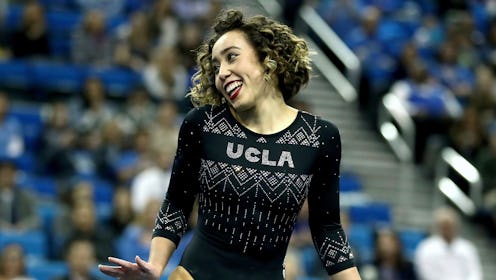Life
Katelyn Ohashi Opened Up About The Body Shaming She Experienced As An Elite Gymnast

Gymnast Katelyn Ohashi was featured in ESPN's most recent Body Issue, and she's using the opportunity to speak out about body shaming. Famous for infusing immense joy into her sport, Ohashi has not always had a positive relationship with the way gymnastics made her feel about her body. Ohashi opened up about disordered eating and body shaming in an elite sport that demands a particular body type and shames others.
"I became an elite gymnast when I was 12 years old," Ohashi said in her feature in ESPN's Body Issue. "Everything became less about me and what I wanted and more for everyone around me." The urgent need to please everyone around her translated into an antagonistic relationship with food and with her own body. From her home life to her training life, she was shamed for taking pleasure in food, and even for wanting it at all.
Things were especially confusing and painful for the child athlete, because she "didn't really understand why I was supposed to hate it, but I loved it so much at the same time." And she had no support to help her love her body through her sport. In fact, her social norm within the elite gymnast world was to deprive herself of food. "It was so normalized because all the girls around me, my close friends, were doing the same thing," she wrote.
In a May 2019 interview with BBC Sport, Ohashi talked about how hard it was to break out of that cycle of abuse and find joy in her sport and herself again. Of the intense body shaming she and her fellow child athletes experience, she said that "I do think it's a form of abuse. It was common, especially in the elite world."
According to a 2017 study published in the Journal of Sports Sciences, harmful relationships with food and high levels of body dissatisfaction are very common among young gymnast girls, especially during competition season. And another 2017 study, this one published in the Journal of Psychoactive Drugs, concluded that young amateur and elite athletes are prone to disproportionately high levels of general anxiety, body dissatisfaction, and disordered eating.
And even outside of the world of elite athletics, young girls face immense pressure to make their bodies fit a physical ideal. This pressure can dramatically impact girls' relationships not only with their bodies, but with their enjoyment of physical activity in general. Indeed, a 2018 study published in the International Journal of Environmental Research and Public Health concluded that young Black and Latinx girls who had the space to enjoy physical activity were more likely to have positive images of their own bodies.
The creation of space for young girls, especially girls of color, to develop affirming relationships with their bodies is tremendously important, and that's part of the message Ohashi wants to spread. Because when she got to UCLA, she wrote that she was finally surrounded by a coaching staff that "puts athletes as people before the sport itself."
That culture of support, she said in her ESPN feature, dramatically improved her mental health and body image, and brought her joy back to her body and her sport. And she hopes that the ebullience in her 2019 Under Armour Collegiate Challenge floor routine (which received a perfect score of 10) will help others find joy in gymnastics amidst so much abuse and body shaming.
She wants young gymnasts to know that it is possible to surround themselves with positive influences, to eat what they want to, and to love their bodies. "Everybody's bodies are different and there's not a single body that is the perfect body because there are constant trends," she said in her BBC Sport interview. "Being comfortable with the only person that matters, yourself, is something that you can forever work towards." And that really is what athletic competition should be about, after all.
If you or someone you know has an eating disorder and needs help, call the National Eating Disorders Association helpline at 1-800-931-2237, text 741741, or chat online with a Helpline volunteer here.